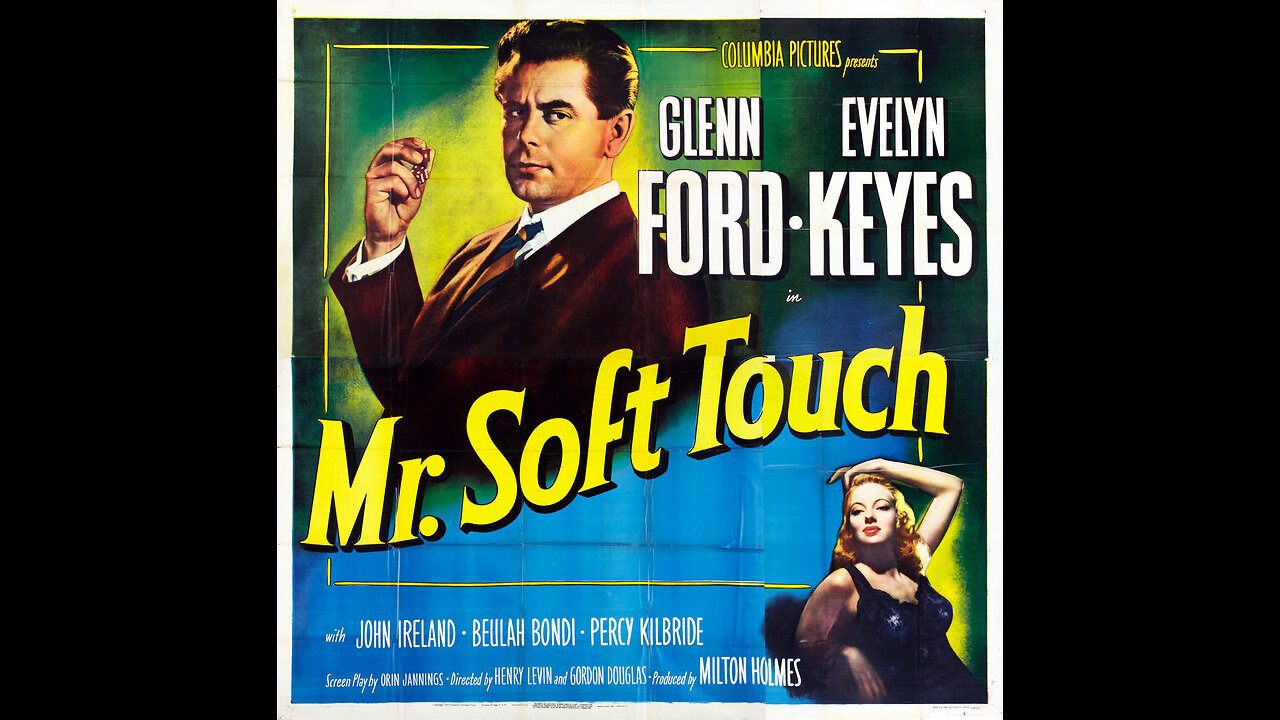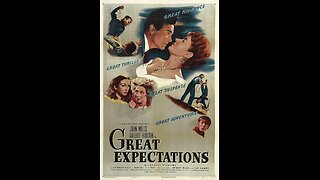Premium Only Content

Mr. Soft Touch (1949) | Directed by Gordon Douglas and Henry Levin
"Mr. Soft Touch" is a 1949 film noir directed by Gordon Douglas and Henry Levin. Starring Glenn Ford and Evelyn Keyes, the film is a unique blend of crime, drama, and comedy.
The film follows Joe Miracle (Glenn Ford), a war veteran who runs a small but struggling charity in post-World War II San Francisco. Facing pressure from the mob to use his charity for illegal activities, Joe decides to take a stand and refuses their demands. In doing so, he becomes a fugitive, seeking refuge in a settlement house run by Jenny Jones (Evelyn Keyes).
As Joe navigates his new life on the run, he becomes involved in a heist that could provide the funds needed to save his charity. However, complications arise, and Joe finds himself torn between doing what is right and succumbing to the criminal underworld.
**Characterization and Performances:**
Glenn Ford delivers a compelling performance as Joe Miracle, portraying the complexity of his character — a man with a troubled past striving to do good. Evelyn Keyes provides a strong counterpart as Jenny Jones, an idealistic woman committed to helping those in need. The chemistry between the two leads adds depth to the film's emotional core.
"Mr. Soft Touch" is notable for its genre-bending approach. It seamlessly blends elements of film noir, crime drama, and comedy. The film transitions between moments of tension and humor, creating a unique and engaging viewing experience. This genre fusion sets it apart from many traditional film noirs of the era.
The cinematography, helmed by Burnett Guffey, captures the post-war atmosphere effectively. The use of shadow and light in certain scenes reflects classic film noir aesthetics, while other sequences embrace a more lighthearted and comedic tone. The visual contrast contributes to the film's tonal shifts.
"Mr. Soft Touch" incorporates elements of social commentary, exploring the challenges faced by war veterans reintegrating into society. Joe's struggles and the portrayal of the post-war urban environment highlight the difficulties of adjusting to civilian life after military service. The film also touches on themes of redemption and the consequences of one's past actions.
The film maintains a brisk pace, blending suspenseful moments with humor and character-driven scenes. The screenplay, co-written by Milton Holmes and Leo Katcher, navigates the tonal shifts effectively, ensuring that the narrative flows smoothly. The dialogue is sharp, and the script succeeds in keeping the audience invested in Joe's journey.
The music, composed by Frank Skinner, complements the film's varied tone. It adapts to the shifting moods, enhancing the emotional impact of key scenes. The soundtrack contributes to the overall atmosphere of the film, whether it be in moments of tension or lighter comedic sequences.
While "Mr. Soft Touch" may not be as widely celebrated as some other films from the film noir era, it stands out for its unique approach to genre blending. Its exploration of post-war themes and its memorable characters contribute to its enduring appeal among cinephiles.
"Mr. Soft Touch" is a noteworthy entry in the film noir genre, offering a distinctive blend of crime, drama, and comedy. The film's successful fusion of genres, coupled with strong performances from Glenn Ford and Evelyn Keyes, makes it an engaging and memorable cinematic experience. While it may not have achieved the same level of recognition as some classic film noirs, its uniqueness and the exploration of post-war themes contribute to its status as a hidden gem worth discovering.
-
 1:58:09
1:58:09
Classic Films & Movies Archive
5 days agoGreat Expectations (1946) | Directed by David Lean
2521 -
 2:08:03
2:08:03
Roseanne Barr
3 hours ago"Neuralink Is The Mark Of The Beast" W/ Tom Althouse | The Roseanne Barr Podcast #105
146K23 -
 1:19:30
1:19:30
vivafrei
9 hours agoHappy 4th of July! Big Beautiful Bill PASSES! Diddy ACQUITTED! Canada's Demise Continues & MORE!
98K51 -
 8:52
8:52
Blackstone Griddles
6 hours agoQuick and Easy Summer Hot Dogs on the Blackstone Griddle
204 -
 9:35
9:35
Clownfish TV
12 hours agoNeil Druckmann Just QUIT The Last of Us...
9964 -
 11:30
11:30
GBGunsRumble
2 hours agoGBGuns Range Report 04JUL25
26 -

Dr Disrespect
7 hours ago🔴LIVE - DRDISRESPECT - LAND OF THE FREE. HOME OF THE TWO-TIME
137K10 -
 1:02:46
1:02:46
Badlands Media
13 hours agoMAHA News Ep. 49: The Patriot Games, RFK Throws CDC Under The Austim Bus, Medicaid Fraud
36.4K1 -
 LIVE
LIVE
Quite Frankly
1 day agoLiberty Weekend 1986 - Commercials And All!
199 watching -
 45:49
45:49
The Quartering
5 hours agoHasan Piker In HUGE Trouble, Near Disaster In The Sky!
130K30